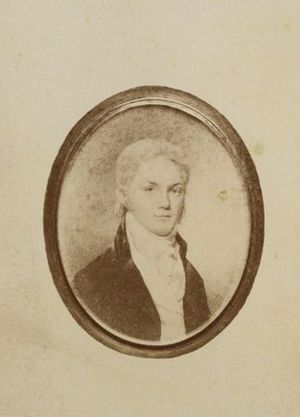Charles F. Mercer facts for kids
Quick facts for kids
Charles F. Mercer
|
|
|---|---|
 |
|
| Member of the U.S. House of Representatives from Virginia's 14th district |
|
| In office March 4, 1823 – December 26, 1839 |
|
| Preceded by | Jabez Leftwich |
| Succeeded by | William M. McCarty |
| Member of the U.S. House of Representatives from Virginia's 8th district |
|
| In office March 4, 1817 – March 3, 1823 |
|
| Preceded by | Joseph Lewis, Jr. |
| Succeeded by | Burwell Bassett |
| Member of the Virginia House of Delegates from Loudoun County | |
| In office December 3, 1810 – March 3, 1817 Serving with William Noland, Thomas Gregg
|
|
| Preceded by | Stephen C. Roszel |
| Succeeded by | Joseph Lewis, Jr. |
| Personal details | |
| Born |
Charles Fenton Mercer
June 16, 1778 Fredericksburg, Virginia |
| Died | May 4, 1858 (aged 79) Howard estate, Alexandria, Virginia |
| Alma mater | Princeton College |
| Military service | |
| Allegiance | |
| Rank | Lieutenant colonel |
| Battles/wars | War of 1812 |
Charles Fenton Mercer (born June 16, 1778 – died May 4, 1858) was an important American politician and lawyer. He came from Loudoun County, Virginia. Mercer served in the U.S. House of Representatives and the Virginia General Assembly.
Contents
Early Life and Education
Charles Fenton Mercer was born in Fredericksburg. His father, James Mercer, was a lawyer and politician. Charles became an orphan when he was fifteen years old.
He went to Princeton College in New Jersey. He graduated in 1797. The next year, President George Washington made him a captain in the cavalry. This was because a war with France was expected, but it never happened.
Mercer went back to Princeton and got another degree in 1800. After that, he traveled around Europe in 1802 and 1803. When he returned to Virginia, he studied law.
Political Career and Public Service
Starting as a Lawyer
Charles Mercer became a lawyer in 1802. He started his law practice in Loudoun County. In 1810, he helped create the village of Aldie, Virginia.
Serving in Virginia
Voters in Loudoun County chose Mercer to represent them in the Virginia House of Delegates. He served there from 1810 to 1817. In his last term, he tried to pass a law to create free public schools for all white children. He also worked on a plan to build a canal along the Potomac River.
Military Service in the War of 1812
During the War of 1812, Mercer joined the military. He became a lieutenant colonel in a Virginia regiment. Later, he was promoted to major and took charge of defenses in Norfolk, Virginia. He also served as an inspector general and an aide-de-camp to Virginia's Governor, James Barbour.
Serving in the U.S. Congress
In 1816, Mercer was elected to the United States House of Representatives. He served there for a long time, from 1817 to 1839. Because of his experience, he became the Chairman of the United States House Committee on Roads and Canals. This committee worked on building roads and canals across the country.
Mercer believed in improving the country's infrastructure, like roads and canals. He was also the first president of the Chesapeake & Ohio Canal Co. from 1828 to 1833.
Fighting Against Slavery
Mercer was against slavery. He helped start the American Colonization Society in 1816. This group worked to send free Black people to a new country called Liberia in Africa. Many important people, like James Madison and Henry Clay, were also members. Mercer became a vice president of the Virginia Colonization Society in 1836. He even visited Europe in 1853 to discuss ending slavery.
Virginia Constitutional Convention
In 1829, voters elected Mercer to the Virginia Constitutional Convention of 1829-1830. This was a meeting to change Virginia's state constitution. Mercer worked on the committee for the legislative branch. Two big topics at this meeting were giving more representation to western Virginia and slowly ending slavery.
Later Life and Legacy
Charles Mercer passed away on May 4, 1858, near Alexandria, Virginia. He was buried in Union Cemetery in Leesburg, Virginia. His important papers are kept at the Library of Virginia.
Images for kids
 | Ernest Everett Just |
 | Mary Jackson |
 | Emmett Chappelle |
 | Marie Maynard Daly |


